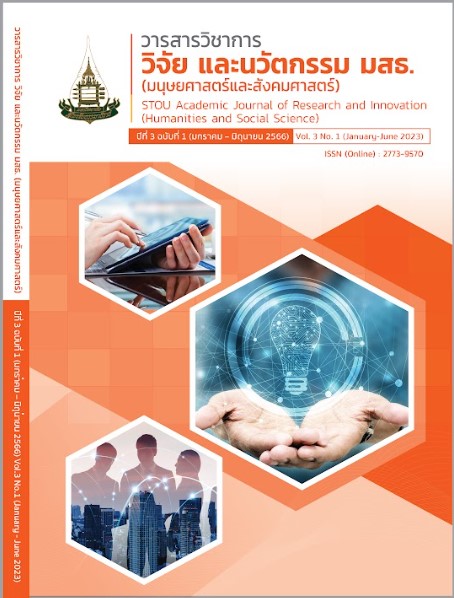อิทธิพลของความผูกพันที่ส่งผลต่อความผาสุกของบุคลากรสำนักงานเศรษฐกิจการเกษตร
Keywords:
Engagement, Well-beingAbstract
The objectives of this research were to study: 1) the engagement and well-being of the Office of Agricultural Economics personnel, and 2) the influence of engagement affecting the well-being of the Office of Agricultural Economics personnel. This study employed a quantitative method. Data were collected by questionnaire distributed to 281 Office of Agricultural Economics Personnel, selected by a simple random sampling. The data were analyzed by descriptive statistics, and inferential statistics for hypothesis testing Multiple regression analysis.
The findings were found that: most of the respondents were female, aged 36 - 50 years, with bachelor's degree. be a government officer and salary less than 20,000 baht per month. had the engagement factor were pride and loyalty to the organization, dedicated efforts to achieve the organization's objectives and maintaining membership and being a part of the organization was at a high level and the well-being factor were nature of work, security and progress, the commander's side is up to 1 level, in terms of enhancing motivation Compensation and benefits, and Location and facilities was at a high level too, and The influence of engagement on well-being it was found that the commitment, pride and loyalty to the organization In terms of maintaining membership and being a part of the organization and the aspect of dedicated efforts to achieve the organization's objectives affected well-being statistically significant at the .05 level, respectively.
References
เนตรณัฏฐ์ ธีรัตม์อังกูร. (2560). ปัจจัยที่มีผลต่อความผาสุกในการทำงานของบุคลากรสายสนับสนุน สถาบันบัณฑิตพัฒนบริหารศาสตร์. (รายงานผลการวิจัย). กรุงเทพฯ: สถาบันบัณฑิตพัฒนบริหารศาสตร์.
ปาริชาติ เยพิทักษ์, ธีระวัฒน์ จันทึก และ พิทักษ์ ศิริวงศ์. (2561). ปรากฏการณ์ความผาสุกขององค์การที่มีความหลากหลายในช่วงวัยทำงาน การศึกษาทฤษฎีฐานราก. กรุงเทพฯ: มหาวิทยาลัยศิลปากร.
ปรีดาภรณ์ ศุทธิเวทิน. (2563). ความสุขในการทำงานของบุคลากรส่วนกลางกรมส่งเสริมสหกรณ์. (สารนิพนธ์ปริญญาบริหารธุรกิจมหาบัณฑิต). มหาวิทยาลัยรามคำแหง, กรุงเทพฯ.
พิเศษ ชัยดิเรก. (2563). ความผาสุกและความผูกพันต่อองค์กรของบุคลากรภาคเอกชนเขตพื้นที่ชะอำและ
หัวหิน. เพชรบุรี: มหาวิทยาลัยนานาชาติแสตมฟอร์ด.
รัชดา เหมปฐวี. (2559). ความผาสุข และความผูกพันต่อองค์กร ของเจ้าหน้าที่ภาครัฐกรมวิทยาศาสตร์บริการ กระทรวงวิทยาศาสตร์และเทคโนโลยี. (สารนิพนธ์ปริญญารัฐศาสตรมหาบัณฑิต). มหาวิทยาลัย ธรรมศาสตร์, กรุงเทพฯ.
ลัดดาวัลย์ เพชรโรจน์ สุภมาส อังศุโชติ และอัจฉรา ชำนิประศาสน์. (2562). สถิติสำหรับการวิจัยและเทคนิคการใช้ SPSS (Statistics for Research and SPSS Application Techniques). พิมพ์ครั้งที่ 3. กรุงเทพฯ: โรงพิมพ์เจริญมั่นคงการพิมพ์.
สังคม ศุภรัตนกุล. (2557). เอกสารประกอบการสอนวิชา ระเบียบวิธีวิจัยและสถิติขั้นสูง (Advance Research Methodology and Statistics) รหัสวิชา DP12101 หน่วยกิต 3 (2-2-5), สำนักงานโครงการบัณฑิตศึกษา: มหาวิทยาลัยราชภัฏอุดรธานี. (อัดสำเนา).
สุชาติ ประสิทธิ์รัฐสินธุ์. (2555). ระเบียบวิธีการวิจัยทางสังคมศาสตร์: แนวทางสู่การปฏิบัติ. พิมพ์ครั้งที่ 10. กรุงเทพฯ: จุฬาลงกรณ์มหาวิทยาลัย.
Ahdika, A. (2017). Improvement of quality, interest, critical, and analytical thinking ability of students through the application of research based learning (RBL) in introduction to stochastic processes subject. International Electronic Journal.
Field, L., & Buitendach, J. (2010). Happiness, work engagement and organisational commitment of support staff at a tertiary education institution in South Africa. SA Journal of Industrial Psychology, 37, 01-10. https://doi.org/10.4102/sajip.v37i1.946
Downloads
Published
How to Cite
Issue
Section
License
Copyright (c) 2023 STOU Academic Journal of Research and Innovation (Humanities and Social Science) (Online)

This work is licensed under a Creative Commons Attribution-NonCommercial-NoDerivatives 4.0 International License.





